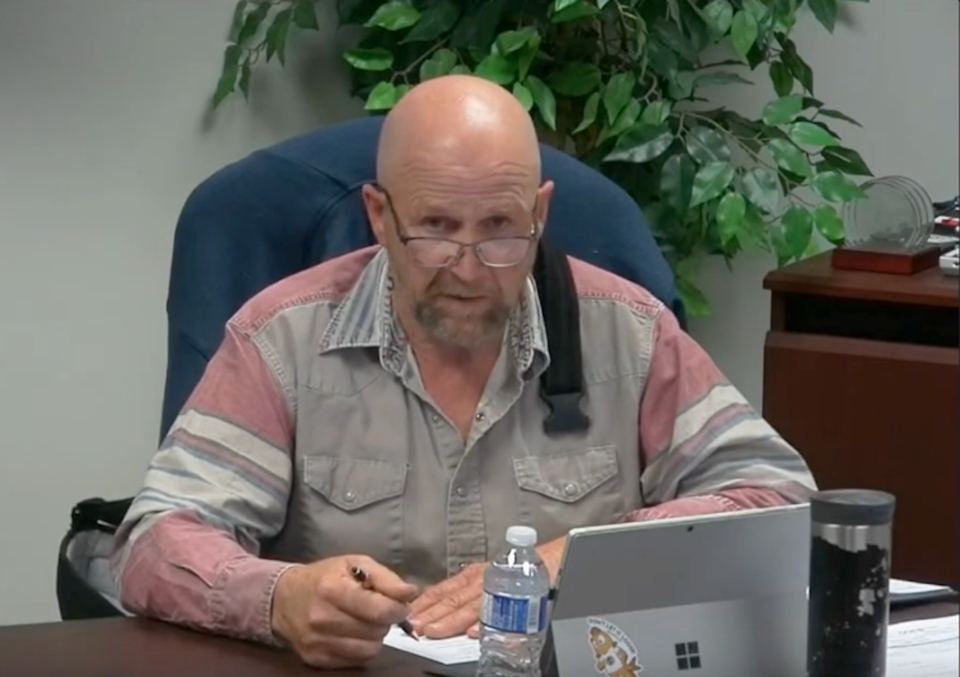BARRHEAD - Electricity generation and rates topped Woodlands County councillors' concerns for their provincial representatives.
Yellowhead West and Athabasca-Barrhead-Westlock MLAs Martin Long and Glenn van Dijken visited Oct. 11's Woodlands County council meeting to field questions of concerns from councillors for the first time since May's provincial election.
Reeve Dave Kusch said Woodlands County residents are already receiving electricity bills in the summer that rival the ones they receive for the highest consumption rates in the dead of winter.
"Many of our residents are already struggling to pay those bills and are wondering how they will pay them in the winter months when their statements are typically three times that of the summer," he said, asking if the province plans to introduce any programs which could help.
Long replied high utility rates are "definitely on the province's radar", referencing the province's pause on renewable energy projects.
He said the pause will give the Alberta Utilities Commission time to investigate the long-term ramifications of individual projects and the industry.
"Renewables is a rapidly expanding area," Long said. "[We need] to bring expectations [of green energy] up to the level of other projects, whether they be oil and gas, mining or other energy projects in terms of reclamation."
He added the electricity market is still feeling "the pain of the rapid takedown of coal fire electricity generation."
"Those are the cheapest forms of energy generation, and to shut it down quickly, before the end of life, cost tax and ratepayers a ton of money," he said. "Until we return to a reliable base energy source, we will continue to see these prices".
However, Long said he has had discussions with Minister of Affordability and Utilities Nathan Neudorf and is confident they will find solutions.
"He has surrounded himself with a great staff, and I am more optimistic than ever about our energy market going forward, but we are still not out of the woods on these prices."
He also noted that electricity prices are only a fraction of what they could be if the federal government continues towards its plan for NetZero for 2035.
van Dijken agreed, saying the message the federal government is sending to industry is not to build any more base-load projects, saying Alberta has minimal power generation options.
"We have coal and natural gas with limited to no ability to move into hydro-electroactivity," he said. "And at the same time, we are stuck with regulations on having electric cars. The two don't jive as we cannot increase our electricity generation with their plans."
On the subject of electricity generation, Whitecourt West Coun. John Burrows asked how far the province was in developing a plan or regulations regarding small modular reactors (SMRs) as the municipality was reviewing its municipal planning profile. He then asked if the county needed to include provisions in their land-use bylaw for the new technology.
According to the International Atomic Energy Agency, SMRs are advanced nuclear reactors that have a power capacity of up to 300 MW(e) per unit, which is about one-third of the generating capacity of traditional nuclear power reactors.
van Dijken believed SMRs were at least a decade away, saying all the work done on them is being done in Ontario.
"Our government in 2019 or 2020 partnered with Saskatchewan, Ontario, and New Brunswick to move that forward. It is a process that continues. I would suggest it has much potential to be retrofitted in many areas in the province. But I understand it is not nearly as restrictive as conventional nuclear power plants," he said.
Whitecourt East Coun. Jeremy Wilhelm asked about Strategic Transportation Infrastructure Program (STIP) funding for airports.
The province created STIP as a way to help municipalities solve their infrastructure deficit as well as to help boost the economy and create jobs as part of its response to the coronavirus.
Wilhelm noted that the Whitecourt airport was one of the busiest in the province in terms of aircraft movements.
"Maintaining [airport] infrastructure is expensive, and we are one of the main hubs for Alberta firefighting services work out of it and being able to maintain it without help from the provincial government would be difficult," he said.
van Dijken replied that it is critical to have a good vision, saying that if the municipality had something in place. s so he could take to the government to help sell the project, such as what Westlock had in place, which helped him secure $1.7 million through the Community Airport Program (CAP) funding via the Ministry of Transportation and Economic Corridors.
Goose Lake/Freeman River Coun. Peter Kuelken said that he was pleased that there would finally be some movement on potential upgrades to the Whitecourt Healthcare Centre; he was more concerned about attracting and retaining healthcare professionals.
Earlier, Long also noted Whitecourt Hospital was one of six hospitals the province had targeted for potential replacement or significant upgrades, receiving three million for funding for planning a new facility.
He said his wife is a nurse at one of the area hospitals, and she couldn't take vacation this summer due to staff shortages.
Long, the Rural Health parliamentary secretary, said it is a difficult situation with no quick fix.
He said some of the stop-gap measures introduced to help alleviate staff shortages, especially in nursing, by enticing professionals who have left the profession back into the workforce, even part-time, may not have had the desired results.
Long said what has happened is to provide some incentive for full-time employees to scale back or for people who would have accepted a full-time position to go part-time.
Another concern he has heard about lately is that some of Alberta's "homegrown talent" currently outside the industry have applied for positions and haven't been put into the workforce.
"It is raising concerns about what the barriers are," he said.
Barry Kerton, TownandCountryToday.com



